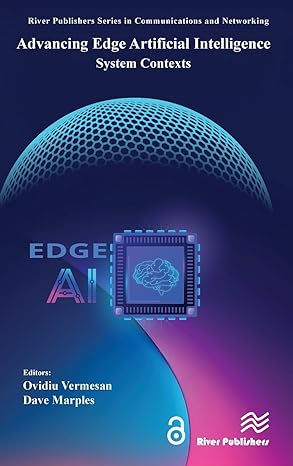
|
FreeComputerBooks.com
Links to Free Computer, Mathematics, Technical Books all over the World
|
|
- Title: Advancing Edge Artificial Intelligence: System Contexts
- Author(s) Ovidiu Vermesan, Dave Marples
- Publisher: River Publishers; 1st edition (March 4, 2024); eBook (Creative Commons Licensed)
- License(s): Creative Commons License (CC)
- Hardcover: 232 pages
- eBook: PDF and Read Online
- Language: English
- ISBN-10: 8770041024
- ISBN-13: 978-8770041027
- Share This:

|
The intersection of AI, the Internet of Things (IoT) and Edge Computing has kindled the edge AI revolution that promises to redefine how we perceive and interact with the physical world through intelligent devices.
About the Authors- N/A
- Artificial Intelligence and Logic Programming
- Internet of Things (IoT)
- Machine Learning
- Neural Networks and Deep Learning
- Robotics and Robot Programming

- Advancing Edge Artificial Intelligence: System Contexts (Ovidiu Vermesan, et al.)
- The Mirror Site (1) - PDF
-
 Intelligent Secure Trustable Things (Michael Karner, et al.)
Intelligent Secure Trustable Things (Michael Karner, et al.)
Artificial Intelligence of Things (AIoT) is the natural evolution for both Artificial Intelligence (AI) and Internet of Things (IoT) because they are mutually beneficial. AI increases the value of the IoT through machine learning by transforming the data into useful information.
-
 Shaping the Future of IoT with Edge Intelligence (Rute C. Sofia)
Shaping the Future of IoT with Edge Intelligence (Rute C. Sofia)
Technologies that empower edge intelligence, along with their use in novel IoT solutions: how 5G/6G, Edge AI, and Blockchain solutions enable novel IoT-based decentralized intelligence use cases at the edge of the cloud/edge/IoT continuum.
-
 Mobile Edge Computing (Yan Zhang)
Mobile Edge Computing (Yan Zhang)
This open access book offers comprehensive, self-contained knowledge on Mobile Edge Computing (MEC), which is a very promising technology for achieving intelligence in the next-generation wireless communications and computing networks.
-
 AI - Limits and Prospects of Artificial Intelligence (Peter Klimczak)
AI - Limits and Prospects of Artificial Intelligence (Peter Klimczak)
This book explores the limits of AI, describe the necessary conditions for its functionality, reveal its attendant technical and social problems, and present some existing and potential solutions.
-
 AI for Everyone? (Pieter Verdegem)
AI for Everyone? (Pieter Verdegem)
We are entering a new era of technological determinism and solutionism in which governments and business actors are seeking data-driven change, assuming that Artificial Intelligence is now inevitable and ubiquitous.
-
 Making AI Intelligible (Herman Cappelen, et al.)
Making AI Intelligible (Herman Cappelen, et al.)
Can humans and artificial intelligences share concepts and communicate? The questions addressed in the book are not only theoretically interesting, but the answers have pressing practical implications.
-
 What Was Artificial Intelligence? (Sue Curry Jansen)
What Was Artificial Intelligence? (Sue Curry Jansen)
Prescient autopsy of AI self-selling - the rhetoric of the masculinist sublime - is reprinted with a new introduction. Now an open access book, it's a message in a bottle, addressed to Musk, Bezos, and the latest generation of AI myth-makers.
-
 Artificial Intelligence: Foundations of Computational Agents
Artificial Intelligence: Foundations of Computational Agents
This text is a modern and coherent introduction to the field of Artificial Intelligence that uses rational computational agents and logic as unifying threads in this vast field. Many fully worked out examples, expanded coverage on machine learning material, etc.
-
 Robots and AI (Lili Yan Ing, et al)
Robots and AI (Lili Yan Ing, et al)
The book explains new approaches on how robots and artificial intelligence affect the world economy by presenting detailed theoretical framework and country-specific as well as firm-product level-specific exercises.
-
 Artificial Intelligence for Big Data (Anand Deshpande, et al)
Artificial Intelligence for Big Data (Anand Deshpande, et al)
You will learn to use machine learning algorithms such as k-means, SVM, RBF, and regression to perform advanced data analysis. You will understand the current status of machine and deep learning techniques to work on genetic and neuro-fuzzy algorithms.
-
 Artificial Intelligence for a Better Future (Bernd Stahl)
Artificial Intelligence for a Better Future (Bernd Stahl)
This book proposes a novel approach to Artificial Intelligence (AI) ethics. AI offers many advantages: better and faster medical diagnoses, improved business processes and efficiency, and the automation of boring work.
-
 On the Path to AI: Foundations of the Machine Learning Age
On the Path to AI: Foundations of the Machine Learning Age
This book explores machine learning and its impact on how we make sense of the world. It introduces readers to the key concepts of machine learning, discusses the potential applications and limitations of predictions generated by machines using data.
-
 The Amazing Journey of Reason: from DNA to Artificial Intelligence
The Amazing Journey of Reason: from DNA to Artificial Intelligence
This book analyses the evolution of complex structures (Organisms, or organized, living, systems) in the universe - from the subatomic particles after the Big Bang onwards - in order to understand the emergence of today's interconnected society.
-
 AI Art: Machine Visions and Warped Dreams (Joanna Zylinska)
AI Art: Machine Visions and Warped Dreams (Joanna Zylinska)
The book critically examines artworks that use AI, be it in the form of visual style transfer, algorithmic experiment or critical commentary. It also engages with their predecessors, including robotic art and net art.





